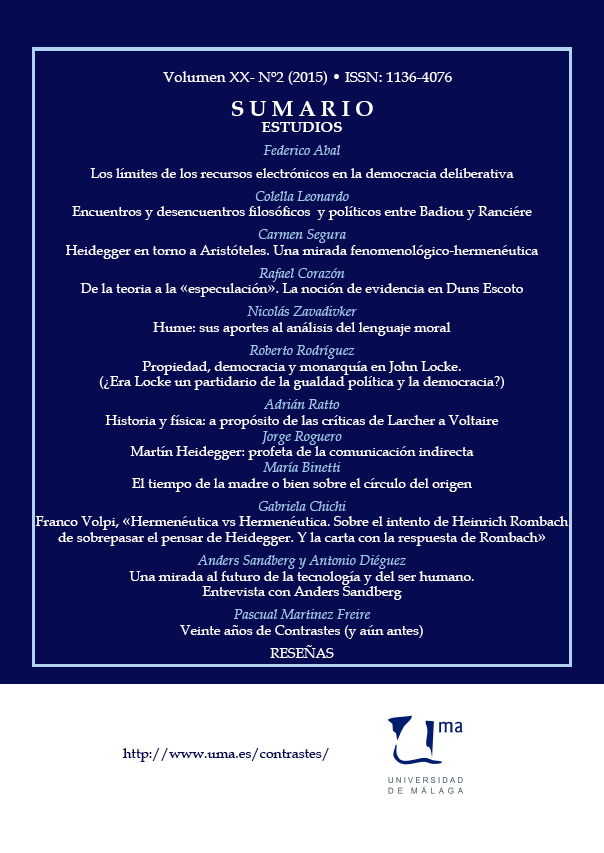Hermetics versus Hermeneutics. About Heinrich Rombach’s Commitment to Surpass Heidegger’s Thought. And Rombach’s Responding Letter
DOI:
https://doi.org/10.24310/Contrastescontrastes.v20i2.2333Keywords:
Rombach, Hermetics, Hermeneutics, Phenomenology, ConcreativeAbstract
This is a translation of an article originally published in German in a special issue dedicated to philosopher Heinrich Rombach. Rombach identified himself as a member of the “Freiburg School” in Breisgau, and delimited by the connection between Husserl and Heidegger, which, despite their differences is Phenomenology. Friends, colleagues and disciples of Professor Rombach, who was back then an active Professor at the University of Würzburg, left traces in this volume of having glimpsed very different paths and gaps in the pursuit of reaching free, open and diverse spaces, characteristic of a structural, intermundane, and intercultural way of doing philosophy. Franco Volpi’s contribution moved along others who focused on the Rombach`s Welt und Gegenwelt, following the first of three movements undertaken by Rombach`s philosophy, namely philosophical Hermetics. Inspired by Welt und Gegenwelt, Volpi claims that with the hermetic project, the thought of Rombach surpasses, in a radical way, the Heideggerian Zeitkritik, and so the Italian Professor examines the contribution of the Hermetics in the tradition of German philosophy, that includes the founder of the school of hermeneutics. The letter with Rombach`s reply to Volpi`s claim, on the other hand, denies Rombach`s involvement with the Zeikritik. Instead, Rombach emphasizes the centrality of the hermetic phenomenon, that is, the immediate and inseparable unity of human being and reality, which happens as they respectively move along together or at the same time, understood by Rombach as a special discover for who can grasp it. According to this, Hermetic is the art of seeing that immediate unity.Downloads
Metrics
Publication Facts
Reviewer profiles N/A
Author statements
Indexed in
-
—
- Academic society
- N/A
- Publisher
- Universidad de Málaga
Downloads
Published
How to Cite
Issue
Section
License
This journal provides immediate free access to its content under the principle of making research freely available to the public. All content published in Contrastes. Revista Internacional de Filosofía, are subject to the Creative Commons Attribution-NonCommercial-ShareAlike 4.0 license whose full text can be found at <http://creativecommons.org/licenses/by-nc-sa/4.0>
It is the responsibility of the authors to obtain the necessary permissions of the images that are subject to copyright.
Authors whose contributions are accepted for publication in this journal will retain the non-exclusive right to use their contributions for academic, research and educational purposes, including self-archiving or repository in open access repositories of any kind.
The electronic edition of this magazine is edited by the Editorial Service of the University of Malaga (Uma Editorial), being necessary to cite the origin in any partial or total reproduction.










5.png)
